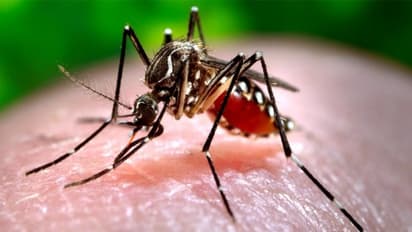National Dengue Day 2024: Important signs, symptoms and complications of severe dengue

Synopsis
National Dengue Day 2024: Severe dengue is a significant medical emergency. It can cause shock, internal haemorrhage, organ failure, and even death.
Every year, on May 16, national Dengue Day is marked to raise awareness about the disease and how to prevent it. Dengue fever is a viral ailment transmitted by mosquitoes. It passes from mosquitos to people and is more prevalent in tropical and subtropical areas. Common dengue symptoms include a high fever, headache, body aching, joint and muscle pain, nausea, and a rash. Most dengue patients recover within 1-2 weeks.
However, in severe situations, dengue can be lethal. Preventing mosquito bites is the most efficient strategy to reduce dengue transmission. On National Dengue Day 2024, let us learn more about severe dengue.
National Dengue Day 2024: Symptoms and effects of severe dengue.
Severe dengue, commonly known as dengue hemorrhagic fever, can lead to significant consequences, including death. It causes an individual's blood vessels to become damaged and leaky, and platelets diminish dramatically.
Also Read: International Day of Light 2024: Date, History, significance of this UNESCO event
Signs and Symptoms
Most dengue patients experience moderate symptoms for 1-2 weeks. Severe dengue, on the other hand, need hospitalisation for treatment. Some signs of severe dengue include:
- Severe abdominal pain
- Vomiting
- Rapid breathing
- Fatigue
- Restlessness
- Pale and cold skin
- Weakness
- Bleeding gums
These symptoms normally appear 24–48 hours after the fever has subsided. Those infected for the second time are more likely to get severe dengue.
Complications of severe dengue
Severe dengue is a significant medical emergency. It can cause shock, internal haemorrhage, organ failure, and even death. A severe drop in blood pressure might result in shock. Low platelet counts contribute to internal bleeding.
Also Read: Dengue In Bengaluru -7 tips to keep yourself safe THIS monsoon
Consequently, it is critical to recognise the warning signs and symptoms of severe dengue. Immediate medical attention can prevent the situation from becoming life-threatening.
Explore the latest Lifestyle News covering fashion, wellness, travel, Food and Recipes, and more. Stay updated with trending Health News, fitness tips, and expert insights to inspire your daily living. Discover personalized lifestyle trends that keep you stylish and informed. Download the Asianet News Official App from the Android Play Store and iPhone App Store for everything that adds value to your everyday life.